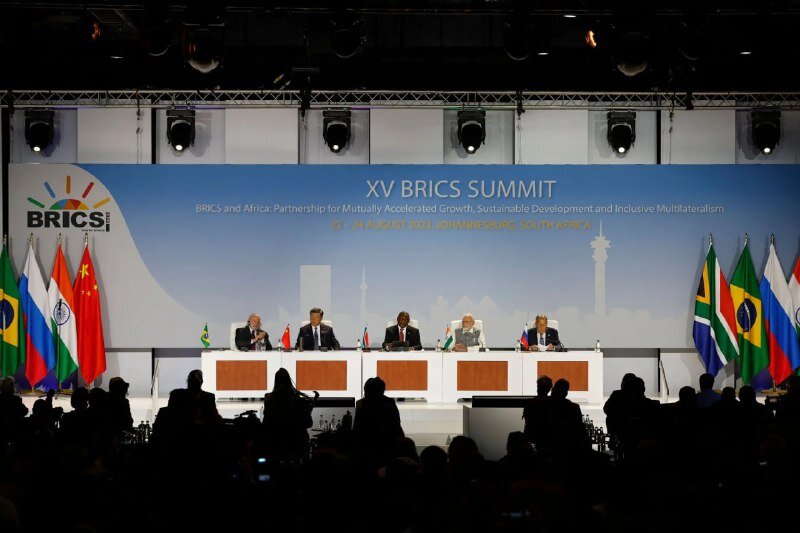What can enlarged BRICS achieve?
U.S. abused the global economy with its dollar

TEHRAN – “We are concerned that global financial and payment systems are increasingly being used as instruments of geopolitical contestation,” Cyril Ramaphosa, South Africa’s president, told last week's BRICS summit.
“Global economic recovery relies on predictable global payment systems and the smooth operating of banking, supply chains, trade, tourism as well as financial flows,” Ramaphosa said as he hosted the summiteers in Johannesburg.
The joint Johannesburg II declaration also encouraged the use of local currencies for trade between BRICS countries and other trading partners.
“We task our Finance Ministers and/or Central Bank Governors, as appropriate, to consider the issue of local currencies, payment instruments and platforms and report back to us by the next Summit,” the statement said.
Brazil's President Luiz Inacio Lula da Silva called on member nations to create a common currency for trade and investment between each other.
A BRICS currency "increases our payment options and reduces our vulnerabilities," Lula da Silva said.
Behind those vulnerabilities is the U.S. dollar and its control on global trading and transactions between states.
There may not be consensus on that proposal yet, but the idea of switching trade between member countries to national currencies was largely floated about.
At the summit, President Xi Jinping of China spoke of promoting "the reform of the international financial and monetary system."
BRICS has mulled ways to both reach and strengthen that goal. Expansion of the bloc was decided as one of the best ways to achieve that.
One of the surprising aspects of the expansion was always going to be the naming of the countries that were to be invited to join.
What BRICS decided was to initially invite six states to join the bloc on January 1, 2024. Among them are the world's energy giants.
Before the start of its annual summit in South Africa last week, more than 40 countries had expressed interest in joining BRICS, and 23 formally applied for membership.
The new members are diverse but also geographically important.
With Egypt in North Africa, Ethiopia in East Africa or the Horn of Africa, and across to West Asia with Saudi Arabia, the United Arab Emirates and Iran. Also, Argentina (with Brazil already a member), that's going to link up the two largest economies in South America.
It is a momentous step forward for BRICS.
The new countries have an enormous trade potential that is going to expand a lot more. The New Development Bank, with former Brazilian president Dilma Rousseff as its head, is going to play a big role in that. It's going to give loans in other currencies other than the U.S. dollar.
BRICS will now be able to greatly invigorate its worldview of a multilateral system.
The new countries in West Asia, invited to join BRICS, together control around 50 to 60 percent of the global oil market. That's going to give BRICS enormous weight.
By adding these six nations to the countries that now form BRICS - Brazil, Russia, India, China, and South Africa - a serious rival financial system will take shape in the global economy.
That may reverse one of the greatest mistakes ever made in economics, which was using just one single currency in international trade, the U.S. dollar.
Decades of attempts by the U.S. to impose one currency on the international financial system have generated the political power of the United States and its financial system over time.
This power is something that has been widely abused by the U.S. and gives an expanded BRICS a significant opportunity to challenge that with its financial transactions.
Now that the dominant oil producers are set to join, BRICS can change global economics into a fair playing field.
The fact that the world has been operating on a U.S. currency the American manufacturing sector has suffered at the expense of strengthening the U.S. financial sector. That has resulted in a perverted global economic system.
The major mechanism with which the global monetary system has been operating is SWIFT, a system which has illegally excluded states from its payments. These states have been unfairly locked out of international trade.
With the expansion of BRICS, devising an independent monetary transfer system to break away from the dollar will challenge the U.S. financial hegemony.
The U.S. dominance has resulted in a less effective global economy and a system that is dominated by finance rather than real production.
Using common currencies will give an enormous amount of power to the BRICS parties to expand trade.
It’s possible that BRICS could eventually surpass 50% of the global population, as many more countries have expressed their desire to join. It will be invigorating for the BRICS economy to pick up a strong alternative financial system that cannot be interfered with.
In the short term, for example, Argentina, which has been invited as a new member, and has seen its economy in turmoil because of its dollar debts to the international monetary fund, Brazil and Argentina will start working together in their common currencies.
This will further expand the economy of Brazil as well as help Argentina overcome its financial woes.
The expansion of BRICS means more trade can be conducted in local currencies. The Chinese yuan or the Indian rupee, will benefit current BRICS members to enhance their financial transactions and economies
The original five BRICS members are expected to have a combined GDP of $27.6 trillion in 2023, representing 26.3% of the global total. With the new members included, the expected GDP would climb to nearly $31 trillion, enough for about 30% global share.
